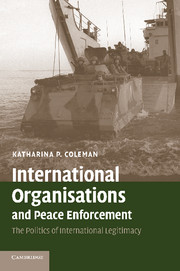Book contents
- Frontmatter
- Contents
- List of maps
- List of figures
- List of tables
- Acknowledgements
- List of abbreviations
- 1 Introduction
- 2 States, international organisations, and legitimacy: a theoretical framework
- 3 Peace enforcement through sub-regional organisations: the Economic Community of West African States and Operation Liberty in Liberia
- 4 Peace enforcement through sub-regional organisations: the Southern African Development Community and Operation Sovereign Legitimacy in the Democratic Republic of Congo
- 5 Peace enforcement through sub-regional organisations: the Southern African Development Community and Operation Boleas in Lesotho
- 6 Peace enforcement through a military alliance: the North Atlantic Treaty Organisation and Operation Allied Force in Kosovo
- 7 Peace enforcement through a global organisation: the United Nations and INTERFET in East Timor
- 8 Conclusion
- Epilogue: UN intervention in Lebanon
- Appendix: Summary of interviews conducted
- Bibliography
- Index
5 - Peace enforcement through sub-regional organisations: the Southern African Development Community and Operation Boleas in Lesotho
Published online by Cambridge University Press: 10 November 2010
- Frontmatter
- Contents
- List of maps
- List of figures
- List of tables
- Acknowledgements
- List of abbreviations
- 1 Introduction
- 2 States, international organisations, and legitimacy: a theoretical framework
- 3 Peace enforcement through sub-regional organisations: the Economic Community of West African States and Operation Liberty in Liberia
- 4 Peace enforcement through sub-regional organisations: the Southern African Development Community and Operation Sovereign Legitimacy in the Democratic Republic of Congo
- 5 Peace enforcement through sub-regional organisations: the Southern African Development Community and Operation Boleas in Lesotho
- 6 Peace enforcement through a military alliance: the North Atlantic Treaty Organisation and Operation Allied Force in Kosovo
- 7 Peace enforcement through a global organisation: the United Nations and INTERFET in East Timor
- 8 Conclusion
- Epilogue: UN intervention in Lebanon
- Appendix: Summary of interviews conducted
- Bibliography
- Index
Summary
Barely one month after Zimbabwe, Angola, and Namibia claimed SADC auspices for their controversial intervention in the Democratic Republic of Congo, South Africa and Botswana launched a peace enforcement operation into Lesotho. The intervention, codenamed Operation Boleas, was led by South Africa and executed by only two SADC members. However, South Africa and Botswana insisted that they were acting on behalf of SADC. This chapter analyses why South Africa chose to launch Operation Boleas within the SADC framework. It begins by briefly sketching the historical background of the intervention and then argues that neither respect for international law nor a desire for burden-sharing can explain South Africa's choice of the SADC framework. By contrast, the legitimacy-centred theory of the role of international organisations in peace enforcement operations developed in chapter 2 finds considerable support. South Africa had substantial concerns about Operation Boleas's international legitimacy, which operating within the SADC framework helped address. The importance South Africa attached to this legitimacy can be gauged by the considerable costs it incurred to secure the SADC mandate.
Operation Boleas marks SADC's coming of age in the domain of regional peace and security. South Africa and Botswana had hitherto staunchly and publicly sought to deny SADC auspices to the Zimbabwe-led intervention in the DRC. Now, however, they too wished to benefit from the international legitimacy those auspices could bestow on an intervention and recognised that SADC's legitimising potential depended on its presenting a united front to the rest of the international community.
- Type
- Chapter
- Information
- International Organisations and Peace EnforcementThe Politics of International Legitimacy, pp. 160 - 193Publisher: Cambridge University PressPrint publication year: 2007



